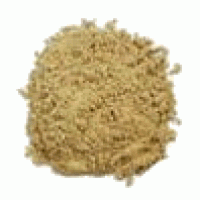The root is warming to the body, is slightly antiseptic and promotes internal secretions. Chop about 2 inches of the fresh root, cover with one cup of water, and simmer for about 20 minutes or ½ teaspoon of the powdered root can be simmered in one cup of water. Add lemon juice, honey, and a slight pinch of cayenne. A few teaspoons of brandy will make an even more effective remedy for colds. This preparation treats fevers, chest colds and flu. A bath or a foot-soak in hot ginger tea is also beneficial. The tea without additives helps indigestion, colic, diarrhea and alcoholic gastritis. Dried ginger in capsules or in juice is taken to avoid carsickness, seasickness and morning sickness. Use about ½ teaspoon of the powder (2 capsules) 30 minutes before departure and then one to two more as symptoms begin to occur. Works well for dogs and children. Ginger is also seen as being useful for controlling and relieving the nausea that can result from cancer chemotherapy.
Ginger
contains zingibain, a special kind of proteolytic enzyme that has the
ability to chemically break down protein. Clinical studies have shown
that proteolytic enzymes have anti-inflammatory properties. They also
play an additional role in controlling autoimmune disease. They help
reduce blood levels of compounds known as immune complexes. Ginger is
also well-known for its anti-inflammatory properties. Indian and
Scandinavian studies have consistently shown that ginger is useful for
treating most kinds of arthritis. It also contains more than 12
antioxidants. It can be taken as a tea, tincture or capsule Ginger
actually gives other herbs a boost by improving the body's ability to
assimilate them. Ginger actually protects herbal compounds from being
destroyed by the liver and continue circulating in the blood for a
longer time. It also improves the intestines absorption of other herbs.
Properties:
warming, apertif, carminative, stimulant, stomachic, diaphoretic, antidepressant, expectorant, antiematic, analgesic, rubefacient, counter-irritant, analgesic, anti-oxidant, antiseptic, antispasmodic, antitussive, and tonic
Remedies:Intestinal Parasite Tea ½ teaspoon chamomile flowers; ½ teaspoon each elecampane root, ginger rhizome, rosemary leaves and thyme leaves; 3 cups water Combine herbs and water in a saucepan. Bring to a boil, then turn off heat and steep for at least 30 minutes. Strain out herbs. For a 50-pound child, give at least 1 cup per day until parasites are gone.
For Athlete's Foot: a decoction of an oz of chopped ginger root to a cup of boiling water. Simmer for 20 minutes and apply it directly to the problem areas twice a day with a cotton ball.
For bunions: drink ginger tea made with one tsp of grated fresh ginger per cup of boiling water. Drink each day and apply grated ginger directly to the bunion once or twice a day as well. Use a strong ginger tea for colds and flu because of the dozen antiviral compounds. Also try the tea as a cough suppressant. For hives try a bath with a decoction of a halfpound of ginger in a gallon of water simmered for 5 minutes. For indigestion try a teaspoon of ginger in tea.
Ginger Compress: for cramps, nausea and pain - 2 tablespoons ginger root or powder. Steep ginger root or powder in 2 cups of boiled water for 15-20 minutes. Keep the decoction covered until ready to use. Dip a clean cloth or washcloth into the tonic, squeeze out any excess liquid and apply warm to the abdomen. Reapply every 15 minutes as necessary.
Cautions:
for oil: don't use if inflammatory skin diseases, high fever, bleeding or ulcers are present. Avoid excessive amounts of ginger if the stomach is already hot and over-stimulated, as in peptic ulceration.
Ginger Powder - fever, colds, flu
- Product Code:MH021
- Availability:In Stock
-
R45.50

